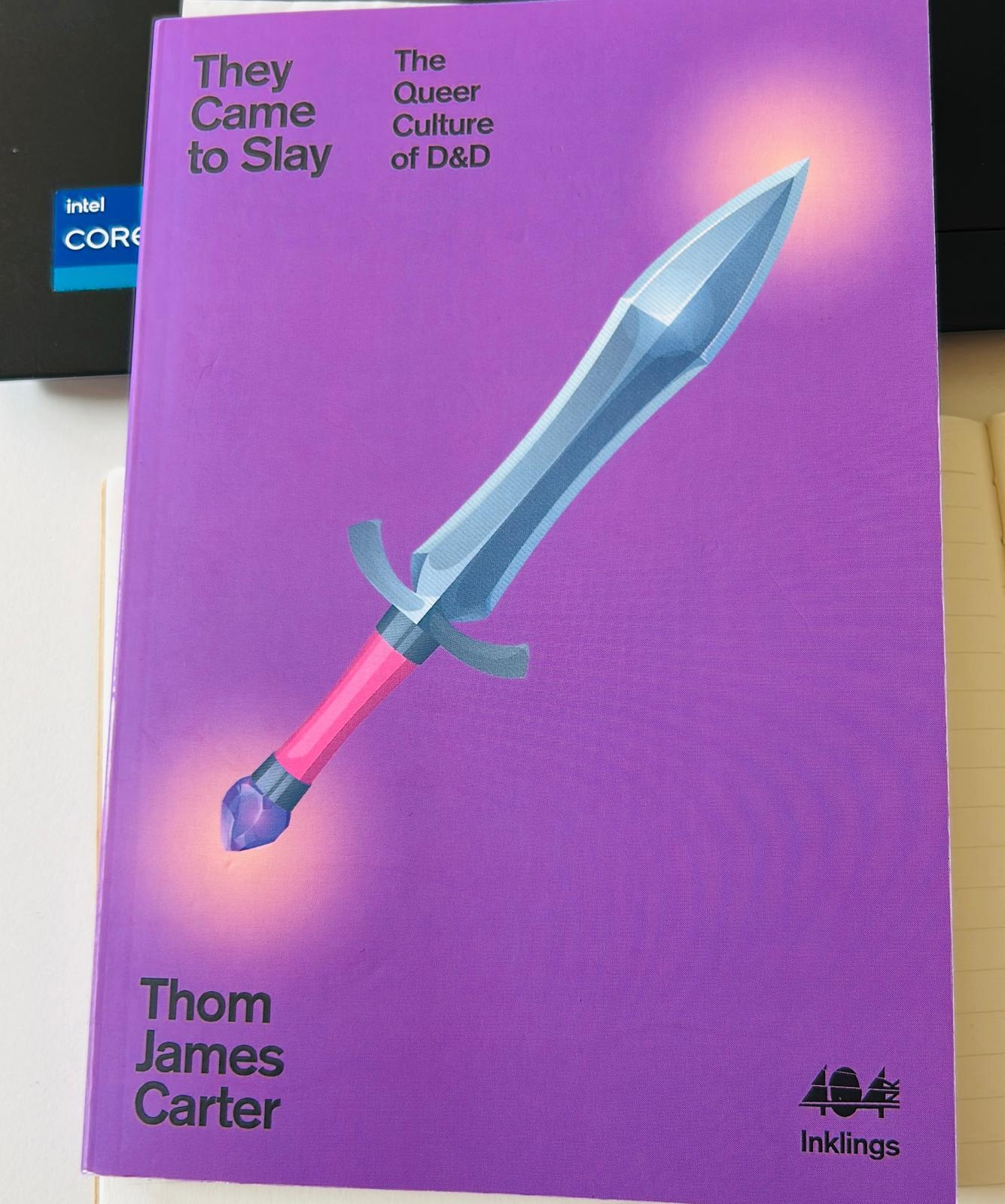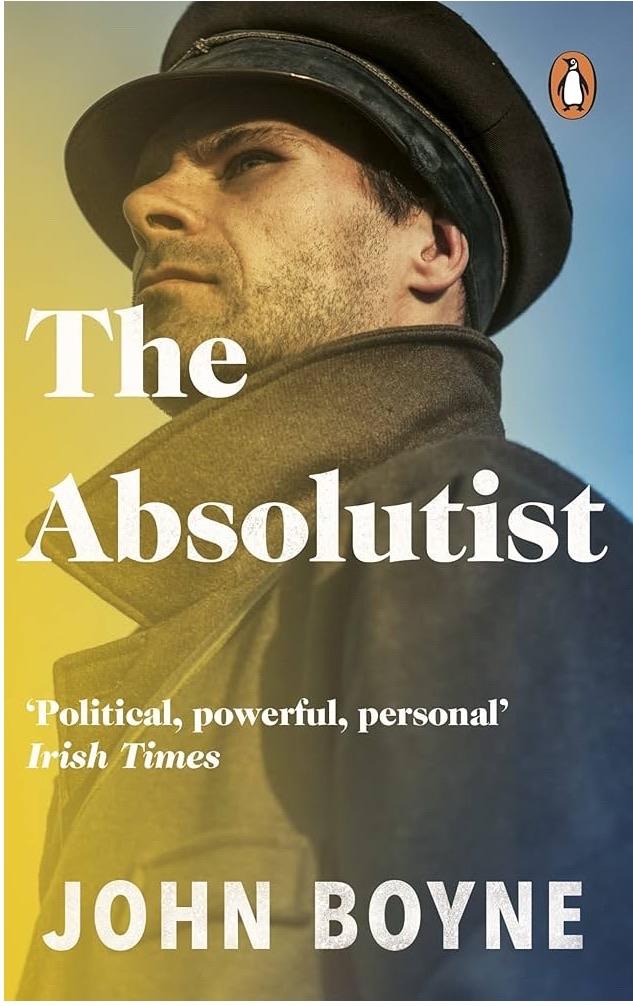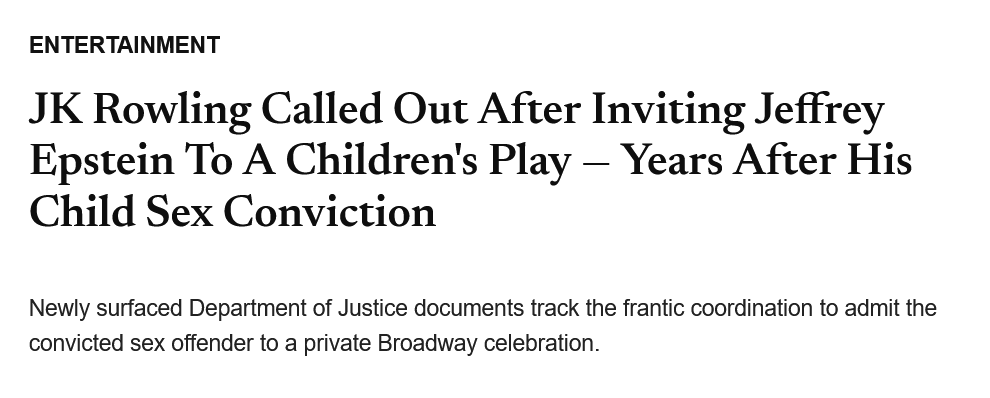Search results for tag #bookstodon
Book 9 was The Library of the Dead by T. L. Huchu (narrated by Tinashe Warikandwa).
In alternative history, post-apocalyptic Scotland, 14-year-old Ropa works as a ghost-talker. But with someone hurting children, leaving them old before their time, she has to act.
Review: https://app.thestorygraph.com/reviews/e82e2971-3045-4bc2-83c1-ff0905b76539
In the last few years I've only used my Kobo to read books. Now, I'm craving a physical book, and I'm pondering the pros and cons of an e-reader.
But I'm afraid that for as much as I'd prefer to own physical copies of all the books I wanna read, an e-reader is so much more convenient:
- Saving physical space
- Setting the font size bigger
- Reading in bed without a light on
- Carrying around a whole library, everywhere
- Having a real-time dictionary under my fingertips
I’m serious about my wishlist. Even in non-romance genres, regardless of context, the lying and pretending stress me out. I may be learning more about what I do like, but I already know what I don’t like.
Maybe this type of romance novel doesn’t exist. What do I know?
*Audiobooks only (no AI narration)
*No straights (queer love only)
*No insta-love (insta-lust maybe)
*No miscommunication trope (fine if they need to work through their own issues, but they need to be honest with one another)
*Minimal will-they/won’t-they
*No possessive alpha types (of any gender)
*No YA
*No dubcon (seriously, just no)
I’ve always said I don’t read romance. But the Skip storyline in Heated Rivalry has me curious. I’m looking for recommendations. But I’m going to be VERY specific about what I do/don’t want.
Please don’t recommend anything without reading below. Self-recs are fine if they meet all the below.
After seeing people rave about Haruki Murakami for years, I decided to read some of his fiction after enjoying “What I Talk About When I Talk About Running.” I got lots of recs on where to start but the only thing my library had available was Wind/Pinball, his first two novels, so I started there.
They’re short, together coming to a little over 200 pages, but I struggled to get through them. Maybe it’s just that I typically read other genres but…I feel like I’m missing some hidden meaning or metaphor in these stories. I finished them feeling a sort of existential numbness?
Also I now entirely understand the critiques of how he writes women.
Book 8 was The Heartbreak Bakery by A. R. Capetta (narrated by Krystal Hammond).
When baker Sid gets dumped, they bake their feelings into a batch of brownies. Everyone who eats one of them breaks up with their significant other.
Review: https://app.thestorygraph.com/reviews/d8fb43f5-5e16-4842-af2a-b14d175f59d6
![]() This Account Kills Fascists [She/Her/Sir (I hate "ma'am")] » 🌐
This Account Kills Fascists [She/Her/Sir (I hate "ma'am")] » 🌐
@violenteastcoastcity@mastodon.social
Just in case anyone needs to know, Heated Rivalry is a TERRIBLE book.
Chertsey Book Barn coming up...
A literal *barn* filled with books.
We need to get to a museum this afternoon so I can't spend too long there but I'm a wee bit excited.
#Bookstodon #HoneymoonHashtag
Book 7 was Disability Intimacy: Essays on Love, Care, and Desire, edited by Alice Wong, written and read by a full cast.
Got me thinking about what intimacy is, the many different forms it can take, and what that might mean to different people in different contexts. Highly worth a read.
Review: https://app.thestorygraph.com/reviews/7d877aea-a237-4cd4-8eed-4ff440bcdc1b
I started reading Project Hail Mary by Andy Weir - another great beach read if you are a nerd, I guess.
I basically swallowed the first three chapters lounging by the pool this morning, my first book by Andy Weir. This is great writing. It’s a long-ish book but damn, very exciting read and I am so, so into it.
Hey, did you know the Starship Teapot series is available in audio?
Book 6 was A Kiss After Dying by Ashok Banker (narrated by Tania Rodrigues & Saul Reichlin).
The story opens with a newlywed couple on a private island. The wife has murder on her mind. Everything else is a lie.
If you enjoyed Emily Kimelman’s Sydney Rye books, you’re going to love this one.
Review: https://app.thestorygraph.com/reviews/dfcb16e4-834b-4027-8273-7034c6ae83bc?redirect=true
Book 5 was A Marvellous Light by Freya Marske (narrated by David Thorpe).
When Robin is accidentally assigned to the magic ministry, Edwin doesn’t have the time or inclination to show him the ropes.
Review: https://app.thestorygraph.com/reviews/c46c5f14-3237-4095-a881-0ffe55c4366b?redirect=true
#BookReview They Came to Slay, the Queer Culture of DnD - by Thom James Carter
You may have guessed it, but I bought the book because it's purple, and who could resist a title like that? 💜
For anyone who's played #DnD for a while, like myself, there wasn't much new in the book. A little bit predictable. But a fun one to have in my collection regardless, and inspired me to experiment with characters of other genders in future TTRPG sessions.
There is something extraordinary about John Boyne’s ability to take a reader into the trenches of the First World War. It’s beyond any others I’ve read so far. #bookstodon
Butterfly Fish
I'm reading Butterfly Fish by Irenosen Okojie on the Kobo app.
"A green palm wine bottle rolled on the
wet London Street. Its movements were
audible gasps made of glass. It didn't
matter how the bottle had arrived at its
location under the curious yellow gaze
of the lamppost or whether the
messenger had been a postman
delivering for both God and the
dancing devil. The image unfurling
inside the bottle shimmering like
moonlight trapped in glass mattered.
Lick the edges of the picture presented
and you could taste the sour, sweet
traces of palm wine."
#books #bookstodon #WhatImReadingNow
https://www.kobo.com/GB/en/ebook/butterfly-fish-2
Book 4 was User Not Found by Dani Finn.
Jack works for the censorship bureau, reading subversive (i.e. queer) fan-fics for clues of the authors real-world identities. You’ll never guess what happens.
Dark, yet heartwarming and affirming.
Buy it direct: https://danifinn.itch.io/user-not-found
Book 3 was Not Pounded By Anything: Six Platonic Tales Of Non-Sexual Encounters by Chuck Tingle.
Chuck Tingle is the master of erotica – and more latterly, cosy(ish) horror. But he also has a few queer platonic ‘tinglers’.
Surprisingly deep – without compromising the inherent silliness.
Review: https://app.thestorygraph.com/reviews/d772a6d3-0778-48a7-9bea-98ec4ef777d2
Just finished re-reading The Fellowship of the Ring. I’ve read it many times, listened to the BBC adaptation (which I’ve just started again, actually) and watched the films (Ralph Bakshi’s version enchanted me as a child)…. But there really is no substitute for reading it. I’ve taken a picture of a detailed map of Middle Earth and keep referring to it, zooming in on the detail. Familiarity hasn’t dulled its impact, and I’m obviously moving right into The Two Towers.
Adrian Tchaikovsky’s Children of Time series is SO GOOD. I’m a couple of parts in to the 3rd book now. It slowly builds up a growing and convincing world (well, galaxy) and makes me care about what’s going on.
Also, without spoilers, I enjoy that two of the earth ships are called Gilgamesh and Enkidu ^_^
Hoping my library gets the audiobook of the 4th in the series due out this year.
Book 2 was In/Out, written and read by Steph Lentz.
The author grew up deeply embedded in the evangelical movement. Purity culture, ‘I Kissed Dating Goodbye’, traditional gender roles, all that. Until she fell in love with a woman.
Review: https://app.thestorygraph.com/reviews/6cee8d8b-fb00-4d72-b2bb-a4d8512742cb?redirect=true
This should be getting more attention in the press:
Whatever excuse you're using to keep the books on your shelves - you lose.
Somehow, tailscale works on Kobo! Will try this to expedite my personal ebook management.
Good day Fediverse,
This thread will be dedicated to places you can find places selling books on discount for Black History Month. I know money is tight for many, so I created this list to make you more knowledgable while being easy on the wallet.
Anyone may also add any place they see doing discounts as well. Please especially feel free to add places outside of the United States. Let's get educated and help each other create more communities that are inclusive to Black folks. I am already doing my part by moderating this instance.
Down below are the current list of publishers having sales:
Southern Illinois University Press has 20% off on Black History titles with code SIUP20. Their website is http://www.siupress.com/
The University of South Carolina Press has 40% off on ALL books using JBHM26. Their website is https://uscpress.com/
SUNY Press has 30% off on African Studies and African American Studies using SBHM26. Their website is https://sunypress.edu/
This deal is incredible, and it's for the best cause. For the next 19 days, you can get ALL the fiction by me and @charliejane at a special price from Humble Bundle -- and all sales benefit the fantastic folks at the Miss Major Alexander L. Lee Black Trans Cultural Center. #bookstodon #scifibooks
Find our bundle at: https://www.humblebundle.com/books/charlie-jane-anders-annalee-newitz-tor-books
Another upcoming author event alert 🚨 klaxon🚨
Join us on Thursday 19th February, to hear Sarah Moss & Gavin Francis discuss their latest books, My Good Bright Wolf, & The Unfragile Mind. Details on the website:
https://www.tickettailor.com/events/theedinburghbookshop/2031258
#books #Livres #Edinburgh #Edimbourg #Author #Auteur #AuthorEvents #bookshops #librairies #bookstodon #BookEvents #GavinFrancis #SarahMoss #MentalHealth #TheUnfragileMind #MyGoodBrightWolf
New month, new book thread! My first book for Feb was The First by Kipjo K. Ewers (Bastard by Tyla Collier).
Four years after being convicted of murdering her husband, Sophia is executed. When she wakes up, they do it again. And again. Then she escapes.
Reviews: https://app.thestorygraph.com/reviews/12f981b1-a56d-454b-ae00-0111a99c6e9e
Halp
Other half is reading a book where the main character can view a recently deceased person's life
I remember something similar - seeing someone's final moments through their eyes (but it not always going 100% right?) and using it to solve crimes and such - from a TV series/film... Or maybe another book?
But I'm just not able to remember the character/thing I saw.
Friends have made several suggestions, mostly stuff I haven't seen.
Any ideas?
#TV #bookstodon #movies #tropes
Feeling deeply disillusioned with the state of tech (and—let’s be real—everything else) these days.
Anyone have recs for a book that will help displace this despair in favor of hope, specifically as it pertains to technology?
You’d think after writing all these books I could join the #NZ Society of Authors but I’m not sure I qualify! Most of my books have been published abroad (mainly UK and Sweden). I do have one NZ-published title but the publisher (what is now Yoobee) is not an established publisher, but a school.
You can be a Kiwi living abroad and join but a Kiwi living here who is published abroad might be outside their criteria!
Might have to ask them as this sounds a bit odd. #book #bookstodon #Aotearoa
Finished #scifi #audiobook There Is No Antimemetics Division by qntm. Interesting story, unusual, bit hard to follow but it may be that's on purpose as it's about dangerous, predatory ideas or "antimemes" that repel or attack memory and thought, and a research group created to study and defend against them. A world-ending antimeme threatens all of existence and this group must find a way to fight it, all while not being able to remember it or the project except while in a special, secure environment where it's safe to basically re-learn everything they've forgotten about it. ⭐ ⭐ ⭐ #bookstodon
Book 33 (and my final for the month) was A Frightfully Fatal Affair by Hannah Hendy (narrated by Jenny Funnell).
There’s another murder in Dewstow. Margery and her wife, Clementine, otherwise known as the Dinner Lady Detectives, are on the case.
Review: https://app.thestorygraph.com/reviews/c0013454-82a4-4162-b07c-513a27db8f4c
Book 32 was Mutual Aid by Dean Spade (narrated by Stephen R. Thorne).
Mutual aid is a vital part of resistance, of survival within a capitalistic society. This outlines how it works, why it’s so important, and how it differs from other forms of aid.
Review: https://app.thestorygraph.com/reviews/8256a906-8c1b-420b-835b-3c64f2c9ef32
Book 31 was Heated Rivalry by Rachel Reid (narrated by Tor Thom).
The TV show grew on me, so I was curious. I’m not a romance reader, but there were some really funny moments.
But I am begging publishers to stop hiring Americans to narrate Canadian audiobooks. Please.
Review: https://app.thestorygraph.com/reviews/8929042f-29e4-40fc-b513-cd91e1813987?redirect=true
His name, in case you're wondering, is Canine-Monk because that's how things roll at this point in the story. He looks like a Great Pyrenees. And he makes a mean hot chocolate.
Help a writer out, please. I’m writing a humorous cosy sci-fi murder mystery.
I have a character who is an absolute delight. He’s affirming and wholesome. He’s a monk. I need help naming his religious order. It’s the Siblinghood of the [adjective] [noun].
Suggestions? Please and thanks.
Hello all! I’m in need of book recommendations. I’d like to find a cozy mystery/murder mystery book to take on vacation. Something that is engaging and well-written, isn’t too stressful (my stress cup almost runneth over already), and doesn’t require too much deep thinking. I’m new to the “cozy” book genre, and don’t know what is good or where to start. I’d welcome any suggestions! Thank you in advance. ❤️📚
#Books #Bookstodon #BookRecs #BookRecommendations #CozyMysteries
Book 30 was Enshittification: Why Everything Suddenly Got Worse and What to Do About It written and read by Cory Doctorow.
The internet was an amazing invention. For a while, it was brilliant. Then, along came the billionaires. Now, we are the product and the customer while they just sit there and collect all our money. And nothing works.
Review: https://app.thestorygraph.com/reviews/436ecf1b-c542-48dd-8f2d-fbf0f42fc233
Book 29 was Cascade by Suzanne Hagelin (narrated by Stefan Rudnicki).
Kierkad is a sentinel charged with guarding the Earth. When he’s ordered to ignore the arrest of a child, he rebels. Soon, he’s questioning all his orders.
Review: https://app.thestorygraph.com/reviews/fa399a98-ed09-452f-b22c-28e0618ffa68?redirect=true
Question: if you're UK based and you don't work for a publisher....have you heard of the National Year of Reading? #Bookstodon #Books
Book 28 was Savvy Summers and the Sweet Potato Crimes by Sandra Jackson-Opoku (narrated by Karen Chilton).
Fun, funny, and made me hungry!
Review: https://app.thestorygraph.com/reviews/eef008a4-d181-4212-abdc-7af5f746fd7a
Book 27 was Surviving Sentience 2040 by Sharon A. McDonell.
Comma is a sentient AI … the first one, in fact. But someone out there REALLY doesn’t want her to exist.
Review: https://app.thestorygraph.com/reviews/9adce02e-651e-4877-9f5d-76b53c08c21d?redirect=true
























